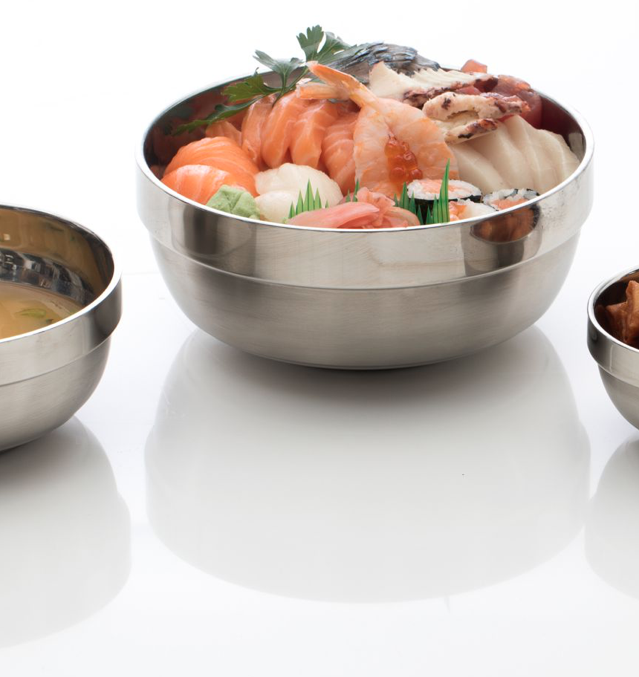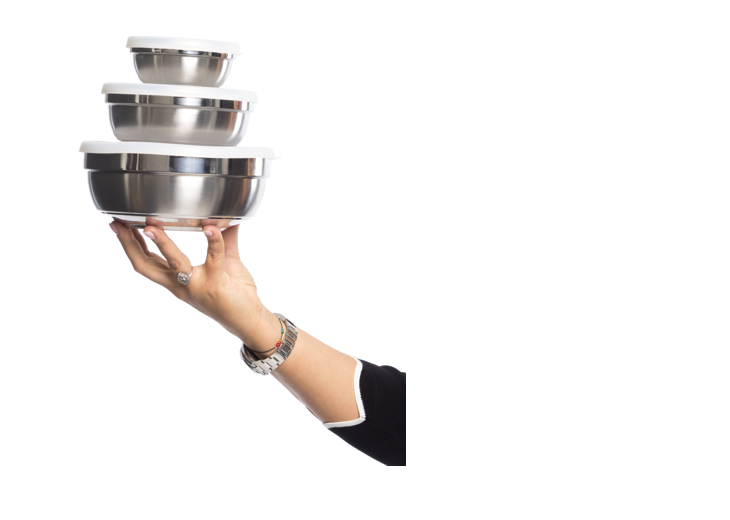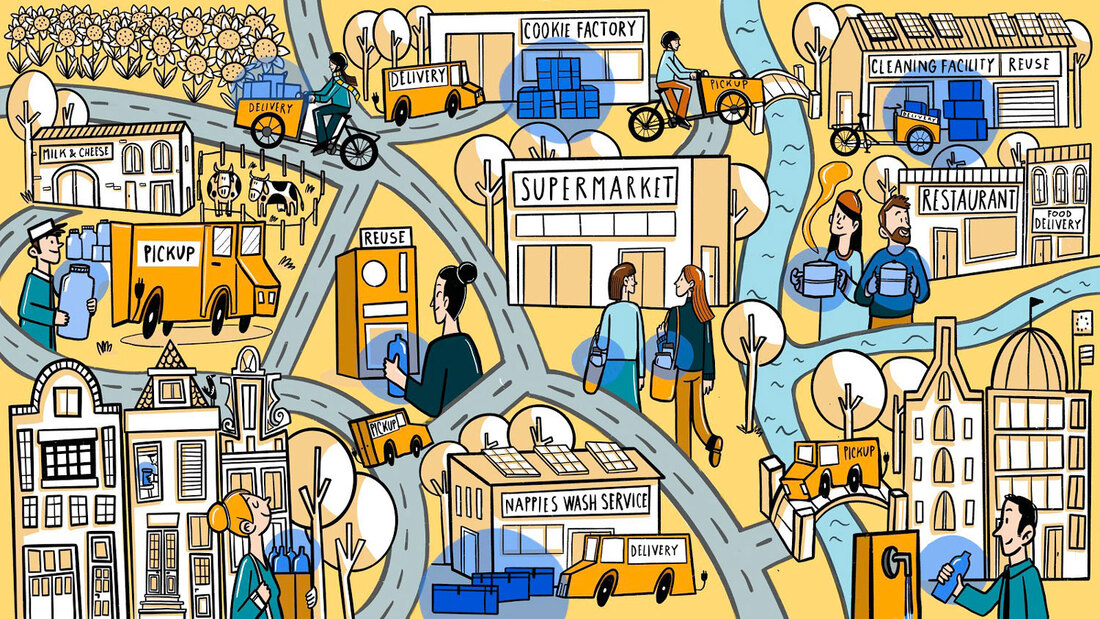Take away and one-way packaging in Austria
Since the beginning of the corona pandemic and the closure of restaurants, take-away orders have become the substitute for dining out. More orders also mean more disposable waste: in Vienna alone, we have almost 100 million disposable packages annually.
As part of the #WeChooseReuse campaign of the global organisation Break Free From Plastic, of which we are an active member, we took a closer look at the takeaway situation in Austria and the Austrian company Skoonu, which is addressing precisely this problem.
A contribution by Monique Robineau, Founder of goBackToOrigin
Translation by Lea Metz of homeyogi.
As part of the #WeChooseReuse campaign of the global organisation Break Free From Plastic, of which we are an active member, we took a closer look at the takeaway situation in Austria and the Austrian company Skoonu, which is addressing precisely this problem.
A contribution by Monique Robineau, Founder of goBackToOrigin
Translation by Lea Metz of homeyogi.
(Disposable) packaging in Austria
Whether it is pizza, kebab or tiramisu for dessert, all of this is delivered individually in plastic or greasy cardboard boxes, which then end up in the garbage 1: 1 and thus pollute our environment. We Austrians produce an average of 588 kg of garbage per person per year, which is well above the average in the European Union. Between 2009 and 2016 there was an increase of 14%. In 2016, a total of around 62 million tons of waste were generated across Austria, according to GLOBAL 2000.
Certainly, this amount has not decreased with the corona crisis and the fast pace of our society, food deliveries and many go-to options. Above all, single-use tableware comes into play: in Vienna alone, 100 million single-use packages are produced every year, only to be used once. That is 1,700 tons of waste of one-way packaging from takeaway and food deliveries, which corresponds to the weight of 485 medium-sized elephants.
The supremacy in the delivery service area: Mjam
When it comes to food deliveries, the Mjam delivery service clearly dominates in Austria. It belongs to the large company Delivery Hero, which has also bought up supply chains such as Foodora and Foodpanda. The company is based in Berlin, Germany, and records around 13 million orders a month in over 40 countries worldwide. These numbers are consistently increasing, in Austria, there are now more than a thousand orders per minute! The advantages of Mjam are clear, around the clock services that make it easy and convenient and in times of Corona are often the only way to get food from restaurants and co. What is positive for the catering industry is bad for our waste volumes. Take-away deliveries usually come in packaging made of plastic or styrofoam, which ends up in the trash straight away.
The food delivery industry already experienced an unexpected boom in 2020 and, according to a forecast by the major Swiss bank UBS, will grow by another 20% worldwide by 2030.
Mjam is also growing: The delivery service has opened its own online supermarket chain with the “mjam market” app. The managing director, Arthur Schreiber, relies on improving existing deficits and above all optimising the duration of the delivery process. While there are waiting times of up to 2 weeks at Billa (at peak times of the Corona crisis), Mjam Market would like to make deliveries possible within 30 minutes.
This expansion has been reinforced by the increasing trend and the great demand for "non-food" and food deliveries since the lockdowns began last year. As a result, Mjam started working with petrol stations in the summer of 2020 in order to also be able to offer “non-food” products. More orders and the expansion of deliveries inevitably mean more disposable packaging. But is there another way?
Certainly, this amount has not decreased with the corona crisis and the fast pace of our society, food deliveries and many go-to options. Above all, single-use tableware comes into play: in Vienna alone, 100 million single-use packages are produced every year, only to be used once. That is 1,700 tons of waste of one-way packaging from takeaway and food deliveries, which corresponds to the weight of 485 medium-sized elephants.
The supremacy in the delivery service area: Mjam
When it comes to food deliveries, the Mjam delivery service clearly dominates in Austria. It belongs to the large company Delivery Hero, which has also bought up supply chains such as Foodora and Foodpanda. The company is based in Berlin, Germany, and records around 13 million orders a month in over 40 countries worldwide. These numbers are consistently increasing, in Austria, there are now more than a thousand orders per minute! The advantages of Mjam are clear, around the clock services that make it easy and convenient and in times of Corona are often the only way to get food from restaurants and co. What is positive for the catering industry is bad for our waste volumes. Take-away deliveries usually come in packaging made of plastic or styrofoam, which ends up in the trash straight away.
The food delivery industry already experienced an unexpected boom in 2020 and, according to a forecast by the major Swiss bank UBS, will grow by another 20% worldwide by 2030.
Mjam is also growing: The delivery service has opened its own online supermarket chain with the “mjam market” app. The managing director, Arthur Schreiber, relies on improving existing deficits and above all optimising the duration of the delivery process. While there are waiting times of up to 2 weeks at Billa (at peak times of the Corona crisis), Mjam Market would like to make deliveries possible within 30 minutes.
This expansion has been reinforced by the increasing trend and the great demand for "non-food" and food deliveries since the lockdowns began last year. As a result, Mjam started working with petrol stations in the summer of 2020 in order to also be able to offer “non-food” products. More orders and the expansion of deliveries inevitably mean more disposable packaging. But is there another way?
Best practice for takeaway packaging: The Austrian company Skoonu
Skoonu is an innovative tableware rental system that makes it possible to take food with you or to order it without producing rubbish. The word comes from Afrikaans, skoon = clean, pure and nu = now.
Skoonu was born out of a need to solve a problem: a family of 6 people order sushi that is eaten in 5 minutes while the packaging is left over. This creates so much rubbish that it almost fills an entire bag. Founder Isabell Weigand wanted to change that and developed a reusable tableware solution for delivery restaurants.
When ordering from one of Skoonu's catering partners, the desired food will be delivered in reusable containers. You can then hand in the dishes at a collection point or at the participating restaurant, and cleaning will then be taken care of on-site.
Step by step application of Skoonu
You can find all the information and the most frequently asked questions on the Skoonu website.
As part of this case study, we wanted to know more about the reusable takeaway solution and talked to founder Isabelle Weigand about the vision, history, the last year and the upcoming projects and goals of Skoonu.
Skoonu was born out of a need to solve a problem: a family of 6 people order sushi that is eaten in 5 minutes while the packaging is left over. This creates so much rubbish that it almost fills an entire bag. Founder Isabell Weigand wanted to change that and developed a reusable tableware solution for delivery restaurants.
When ordering from one of Skoonu's catering partners, the desired food will be delivered in reusable containers. You can then hand in the dishes at a collection point or at the participating restaurant, and cleaning will then be taken care of on-site.
Step by step application of Skoonu
- Install and open the free Skoonu app on your smartphone. You can find the list of all participating companies directly in the app. If your favourite restaurant is not yet listed, you are welcome to use the contact form to contact Skoonu, who will then contact the locales.
- Order as usual at your favourite restaurant via the usual delivery services, such as Mjam, Lieferando or, best of all, directly from the pubs.
- In the Skoonu app you create a transaction number (TAN) with the “green button”, which you enter when ordering food. Simply write this number and the word Skoonu in the comment field when you order. This means that the restaurant knows that you want your food in reusable packaging.
- You then have 14 days to bring your dishes back. You don't have to clean it beforehand, but rinsing or wiping is recommended. You can find out where you can bring the dishes back on the integrated map in the app. But if you like the dishes from Skoonu so much that you don't want to return them, you can of course also buy them at the given prices.
You can find all the information and the most frequently asked questions on the Skoonu website.
As part of this case study, we wanted to know more about the reusable takeaway solution and talked to founder Isabelle Weigand about the vision, history, the last year and the upcoming projects and goals of Skoonu.
In an interview with Isabelle Weigand (CEO) from Skoonu
M: What's your vision? How did Skoonu come about?
I: On the one hand we want to avoid garbage and on the other hand we want to create awareness. Above all, we want to make use of something called circular economy and show that convenience and sustainability do not have to be a contradiction in terms. We have set ourselves the goal of setting up a large network where the reusable system works without it having to be complicated.
M: How were 2020 and the Covid19 crisis for you?
I: Well, we didn't feel the crisis as such. We grew very quickly and strongly last year and have therefore established ourselves well in the market. We are currently in the process of ordering more dishes because the demand is so high. We noticed that during the lockdown phases, awareness of take-away and the corresponding amount of garbage rose sharply and people noticed how much garbage they actually generate with a meal order. Therefore, many have rethought and that was also an advantage for us. So we were able to benefit from the crisis itself.
M: What do you have planned for this year 2021? What are your goals?
I: We want to have 500 partners in Vienna by the end of 2021 and also be active in the other federal states. At the moment we are only represented in Vienna but have planned the first pilot phase outside of Vienna for April, together with the city marketing in Vöcklabruck. We are not there but provide the app. Next up are the big cities like Graz, Linz and Salzburg. We have already received inquiries there, as the public side, in particular, is showing great interest and can provide the appropriate infrastructure. That helps us a lot.
M: How many active users do you have to date? And is there actually any competition?
I: We currently have 2000 active users and are seeing daily growth on the app. Above all, if we can win new partners, the users will also grow, as the restaurants are in the position to spread the word and directly inform their customers of the reusable packaging option.
We don't have any competitors yet, but we would be very happy if others also deal with the topic of single-use waste. Our main purpose is to raise awareness, and it is important that we are not the only ones working on it. In addition, the competition stimulates business, attracts attention and we can prove to ourselves that we are number 1, so we have to constantly invest in our performance, which is also important. We were the first in Vienna and I am very happy when I can tell my grandchildren later that their grandmother was the first in Vienna. (smiles)
I: On the one hand we want to avoid garbage and on the other hand we want to create awareness. Above all, we want to make use of something called circular economy and show that convenience and sustainability do not have to be a contradiction in terms. We have set ourselves the goal of setting up a large network where the reusable system works without it having to be complicated.
M: How were 2020 and the Covid19 crisis for you?
I: Well, we didn't feel the crisis as such. We grew very quickly and strongly last year and have therefore established ourselves well in the market. We are currently in the process of ordering more dishes because the demand is so high. We noticed that during the lockdown phases, awareness of take-away and the corresponding amount of garbage rose sharply and people noticed how much garbage they actually generate with a meal order. Therefore, many have rethought and that was also an advantage for us. So we were able to benefit from the crisis itself.
M: What do you have planned for this year 2021? What are your goals?
I: We want to have 500 partners in Vienna by the end of 2021 and also be active in the other federal states. At the moment we are only represented in Vienna but have planned the first pilot phase outside of Vienna for April, together with the city marketing in Vöcklabruck. We are not there but provide the app. Next up are the big cities like Graz, Linz and Salzburg. We have already received inquiries there, as the public side, in particular, is showing great interest and can provide the appropriate infrastructure. That helps us a lot.
M: How many active users do you have to date? And is there actually any competition?
I: We currently have 2000 active users and are seeing daily growth on the app. Above all, if we can win new partners, the users will also grow, as the restaurants are in the position to spread the word and directly inform their customers of the reusable packaging option.
We don't have any competitors yet, but we would be very happy if others also deal with the topic of single-use waste. Our main purpose is to raise awareness, and it is important that we are not the only ones working on it. In addition, the competition stimulates business, attracts attention and we can prove to ourselves that we are number 1, so we have to constantly invest in our performance, which is also important. We were the first in Vienna and I am very happy when I can tell my grandchildren later that their grandmother was the first in Vienna. (smiles)
Your contribution to more reusable
In order to establish more reusable in our society and to put an end to the one-way madness, companies and industries, but also individuals, are in equal demand. That's exactly what we're fighting for with Break free from Plastic in the #WeChooseReuse campaign.
As an individual, you can sign up for #WeChooseReuse and get active
As a company, you can stand up for #WeChooseReuse and commit yourself by signing the “Open Letter” and thus supporting the circular economy and reusable alternatives and thus advocating a sustainable future. Some Austrian companies and municipalities are already there!
Be part of the solution and choose reuse!
As an individual, you can sign up for #WeChooseReuse and get active
- by choosing reusable and refillable alternatives, as Skoonu prefers and relies on durable products.
- buy packaging-free or packaging-reduced.
- buy from sustainable online shops.
- sign the campaign and share it on your social media or tell your family, neighbours and friends about it.
As a company, you can stand up for #WeChooseReuse and commit yourself by signing the “Open Letter” and thus supporting the circular economy and reusable alternatives and thus advocating a sustainable future. Some Austrian companies and municipalities are already there!
Be part of the solution and choose reuse!
Wir legen großen Wert darauf, eine geschlechterneutrale Sprache zu verwenden, um alle Menschen gleichermaßen anzusprechen. Sollte an bestimmten Stellen unserer Webseite dennoch eine geschlechtsspezifische Formulierung auftauchen, bitten wir um Entschuldigung - unsere Website wird laufend überarbeitet. Unser Ziel ist es, eine inklusive Umgebung zu schaffen, in der sich jeder willkommen fühlen kann, unabhängig von Geschlecht oder Identität.
Zero Waste Austria ist offizielles Mitglied bei:
© 2015-2024 Zero Waste Austria Verein zur Schonung von Ressourcen. All rights reserved.






